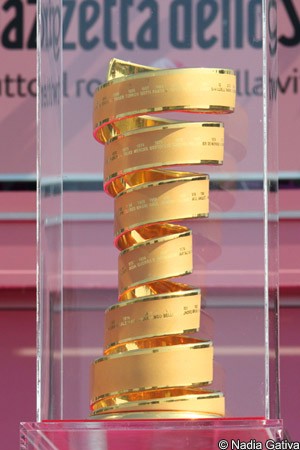Grand Tour will begin in Belfast and conclude in Trieste
 The 2014 Giro d’Italia will reach a climax on one of the toughest climbs in Italy, with the organisers RCS Sport confirming today that the penultimate day of racing will conclude at the summit of the gruelling Zoncolan climb.
The 2014 Giro d’Italia will reach a climax on one of the toughest climbs in Italy, with the organisers RCS Sport confirming today that the penultimate day of racing will conclude at the summit of the gruelling Zoncolan climb.
The ascent has featured just four times in the past as a stage finish, and will ensure that the final outcome of the race is in question right up until 24 hours before the finish. In 2003 Gilberto Simoni soloed in 34 seconds ahead of Stefano Garzelli after the latter tussled with Marco Pantani on the climb; Pantani was riding his final Giro and died less than a year later.
Four years later Simoni triumphed again, winning a sprint against his Saunier Duval – Prodir team-mate Leonardo Piepoli. Andy Schleck took third, seven seconds back, and was en route to a stunning Grand Tour debut where he finished second overall.
The race returned to the climb in 2010 and again in 2011; in the first of those years, Ivan Basso dropped all of his rivals and crossed the line one minute 19 seconds ahead of world champion Cadel Evans. The performance helped seal his eventual overall victory in the race.
The following year Igor Anton became part of Giro history when he was the fourth winner. He attacked on the climb and got a gap on the other GC favourites, with Alberto Contador focussing on Vincenzo Nibali. The eventual race winner dropped the Italian closer to the line, but finished 33 seconds behind an elated Anton, who was returning to top form after crashing out of the previous year’s Vuelta while in the leader’s jersey.
The 2014 race will have its final GC battles on the slopes of the same mountain, where the riders will slug it out on the 10.1 kilometre climb, which averages 11.9 percent and includes ramps over 20 percent. It will produce a ferocious battle for pink.
One day later the race will conclude with a 169 kilometre stage from Gemona del Friuli to Trieste. It will have historical significance as it will coincide with the 60th anniversary of the annexation of the regional capital to Italy.
Trieste has featured four times as either the start or finish location for the Giro. In 1981 one it was the site of the Grande Partenza, while in 1966, 1973 and 1983 it concluded the race. Gianni Motta, Eddy Merckx and Giuseppe Saronni were the overall winners then.
Confirming the race finish there in 2014, RCS Sport has written about the historical significance of Trieste, which featured in the 1946 race. The stage was neutralised as anti-Italian activists who were in favour of the annexation of Trieste to Yugoslavia blocked the road and threw stones and nails at Italian guards.
“The organization of the Giro had already decided to close the stage in Pieris, with equal times for everyone, but some racers – led by Giordano Cottur – insisted on reaching Trieste anyway,” states RCS Sport. “Some riders were escorted on military vehicles up to Grignano, from where they headed for the finish line and made for the hippodrome of Montebello in the north of Trieste, where they were hailed and carried in triumph by the inhabitants of the city.”
The Trieste stage will trace an largely downhill profile and will conclude with eight laps of the city’s 7.3 kilometre circuit.
Race director Mauro Vegni has said that the race was determined to return to the area. “After all the issues with the Crostis stage in 2011 we were very motivated to return the Giro d’Italia in its full splendor to Friuli Venezia Giulia.
“This year we had two beautiful stages rich in meaning: the uphill finish of Montasio Plateau and the Cave del Predil – Vajont one.For 2014, we all had a strong desire to return to the Monte Zoncolan with a stage that could be decisive in deciding the final general classification of the Corsa Rosa.”
He said that the race will conclude the following day in one of the most beautiful squares in Italy, the Piazza Unità d’Italia in Trieste.
RCS Sport managing director Michele Acquarone says that the race’s conclusion – and its start in Ireland – will have a rich symbolism. “It is a unique opportunity: history, tourism, culture. Opportunities for everybody to highlight all the excellence that this area has to offer.
“The 2014 Giro will start from Belfast before moving to Dublin to eventually end in Trieste, coinciding the 60th anniversary of the annexation of the city to Italy. The message is that something beautiful, like the Giro, can go beyond sport and unite peoples and cultures,” he said.